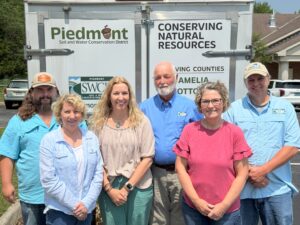Working together, we can protect our environment and conserve Virginia’s natural resources. You can help every day by making small changes to your daily habits!
In your yard:
- Fertilize with care. Contact Virginia Cooperative Extension to learn about testing your soil. Read label instructions and do not over-fertilize. Using the correct amount of fertilizer at the right time can save money and keep harmful chemicals out of local streams.
- Landscape your home with conservation in mind. Cover bare soil to prevent erosion. Contact us for more information about rain gardens.
- Grass clippings are next year’s fertilizer! Composting household waste is a great way to reduce cost and reuse valuable organic material. Click here to visit the USDA composting page.
- Take care of your septic system. Faulty septic systems can pollute local groundwater. Click here to visit our septic systems page.
- If you change your own oil, take the used oil to a recycling station. DO NOT DUMP OIL! One quart of used motor oil can contaminate up to two million gallons of water.
- Collect litter and animal waste before it washes into storm drains or bodies of water.
- Reduce expense by reusing water. Contact us for more information about our rain barrels!
In your home:
- Turning off the faucet while brushing your teeth or shaving can save 2 gallons of water!
- Take short showers, not baths. Efficient shower heads can also reduce your water usage.
- Do not use toilets as trash cans.
- Keep a pitcher of drinking water in the fridge instead of cooling water by running the faucet.
- Run washing machines only when full.
- Repair leaks in faucets, shower heads, and toilets. A dripping faucet at 30 drops per minute wastes 84 gallons a month.
- Recycle household waste, including newspapers, plastics, cardboard, paper, and compost material.
In your cleaning supply closet:
- Homemade cleaners using only non-toxic ingredients offer an alternative to commercial cleaners.
- Before you buy, read labels and choose the product that is best for your job. Buy only what you can use.
- Follow instructions for proper use. Follow safety precautions and USE ONLY THE RECOMMENDED AMOUNT.
- Store properly, according to label instructions. Keep in original container.
- Keep lid tightly closed. Use child-resistant closures.
- If you must dispose of a product, follow label directions if provided. If no directions are provided, read on…
- Water-soluble products (products that can be mixed with water) can be disposed of down the drain with running water. CAUTION: Dispose of powders in very small quantities at a time. This will help prevent them from forming lumps and blocking your drain.
- For non-water-soluble products, call the manufacturer’s toll-free number for disposal recommendations or check with your local waste disposal facility.
- Recycle empty containers.
